-
 Bitcoin
Bitcoin $113900
-1.39% -
 Ethereum
Ethereum $3517
-4.15% -
 XRP
XRP $3.009
1.59% -
 Tether USDt
Tether USDt $0.9997
-0.04% -
 BNB
BNB $766.8
-1.41% -
 Solana
Solana $164.6
-2.38% -
 USDC
USDC $0.9998
-0.02% -
 TRON
TRON $0.3277
0.65% -
 Dogecoin
Dogecoin $0.2023
-1.67% -
 Cardano
Cardano $0.7246
0.05% -
 Hyperliquid
Hyperliquid $38.27
-4.77% -
 Sui
Sui $3.528
-0.52% -
 Stellar
Stellar $0.3890
-0.73% -
 Chainlink
Chainlink $16.16
-2.69% -
 Bitcoin Cash
Bitcoin Cash $539.9
-4.38% -
 Hedera
Hedera $0.2425
-2.00% -
 Avalanche
Avalanche $21.71
-0.97% -
 Toncoin
Toncoin $3.662
5.73% -
 Ethena USDe
Ethena USDe $1.000
-0.02% -
 UNUS SED LEO
UNUS SED LEO $8.964
0.35% -
 Litecoin
Litecoin $107.7
2.33% -
 Shiba Inu
Shiba Inu $0.00001223
-0.40% -
 Polkadot
Polkadot $3.617
-0.97% -
 Uniswap
Uniswap $9.052
-2.49% -
 Monero
Monero $295.1
-3.79% -
 Dai
Dai $0.9999
0.00% -
 Bitget Token
Bitget Token $4.315
-1.85% -
 Pepe
Pepe $0.00001060
0.11% -
 Cronos
Cronos $0.1342
-2.72% -
 Aave
Aave $256.0
-0.87%
MetaMask contract interaction failed? Check authorization and gas settings
To resolve "contract interaction failed" errors in MetaMask, ensure proper authorization and adjust gas settings; increase gas limit for "out of gas" errors and gas price if too low.
May 18, 2025 at 10:00 pm
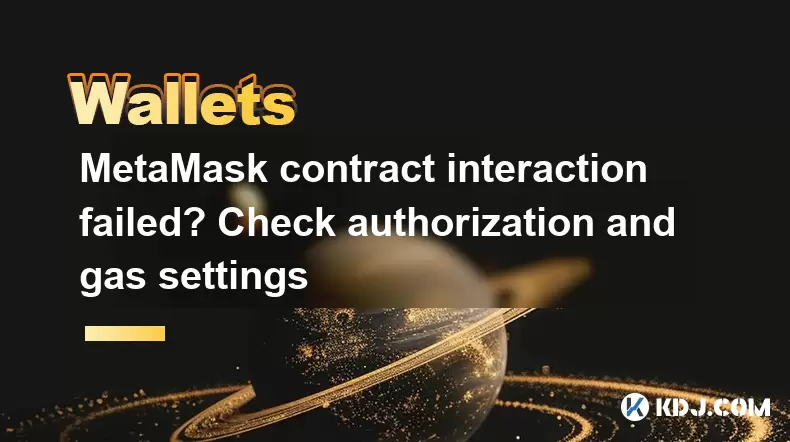
When you encounter a "contract interaction failed" error while using MetaMask, it can be frustrating and confusing. This error often stems from issues related to authorization or gas settings. Understanding these elements and how to properly configure them can help you resolve this problem and successfully interact with smart contracts on the Ethereum blockchain.
Understanding Contract Interaction Failures
Contract interaction failures in MetaMask can occur for several reasons, but the most common are related to authorization and gas settings. When you attempt to interact with a smart contract, MetaMask needs to be authorized to perform the action on your behalf. Additionally, the transaction must include enough gas to cover the computational effort required by the Ethereum network to execute the contract's code.
Checking Authorization Settings
To ensure that your MetaMask is correctly authorized to interact with a smart contract, follow these steps:
- Open MetaMask: Launch the MetaMask extension or mobile app.
- Select the Correct Network: Ensure you are connected to the correct Ethereum network (e.g., Mainnet, Testnet).
- Check Account Permissions: Navigate to the "Connected Sites" section to see which websites have been granted permission to interact with your MetaMask account. If the site you are trying to interact with is not listed, you need to grant permission.
- Authorize the Site: When you visit the site and attempt to interact with a contract, MetaMask should prompt you to connect your wallet. Click "Connect" to authorize the site.
If you have already connected the site but are still facing issues, you might need to reconnect or reset the permissions.
Adjusting Gas Settings
Gas settings are crucial for successful contract interactions. Here's how to adjust them in MetaMask:
- Access the Transaction: When you initiate a transaction, MetaMask will display a confirmation window.
- Edit Gas Settings: Click on "Edit" next to the gas fee section.
- Set Gas Limit: The gas limit determines the maximum amount of gas you are willing to spend on the transaction. If the transaction fails due to an "out of gas" error, increase the gas limit.
- Adjust Gas Price: The gas price is the amount you are willing to pay per unit of gas. A higher gas price can expedite your transaction but will cost more. You can use the "Low," "Medium," or "High" presets or set a custom price.
After adjusting these settings, confirm the transaction and see if it goes through successfully.
Common Gas-Related Issues
Several gas-related issues can lead to contract interaction failures:
- Out of Gas: This occurs when the gas limit set for the transaction is insufficient to cover the execution cost of the contract. Increase the gas limit and try again.
- Gas Price Too Low: If the gas price is set too low, your transaction might not be picked up by miners. Increase the gas price to improve the chances of it being included in a block.
- Gas Estimation Errors: Sometimes, MetaMask may struggle to estimate the correct gas needed for a transaction. In such cases, manually setting a higher gas limit can help.
Troubleshooting Contract Interaction Failures
If adjusting authorization and gas settings does not resolve the issue, consider the following troubleshooting steps:
- Verify Contract Address: Ensure that the contract address you are interacting with is correct. A typo in the address can lead to failed transactions.
- Check Contract Functionality: The smart contract itself might have issues. Verify that the contract is functioning as expected by checking its status on a blockchain explorer like Etherscan.
- Reconnect Wallet: Sometimes, simply reconnecting your wallet to the site can resolve connectivity issues.
- Clear Cache and Cookies: Clearing your browser's cache and cookies can resolve issues related to stale data or corrupted sessions.
Using Advanced Features in MetaMask
MetaMask offers advanced features that can help in managing contract interactions more effectively:
- Custom Networks: You can add custom networks to MetaMask, which can be useful if you are interacting with contracts on testnets or other Ethereum-compatible blockchains.
- Hardware Wallet Integration: Using a hardware wallet with MetaMask can enhance security and provide an additional layer of authorization control.
- Transaction Speed Settings: MetaMask allows you to set transaction speed preferences, which can affect gas prices and transaction times.
Frequently Asked Questions
Q: Can I recover my transaction if it fails due to insufficient gas?
A: Unfortunately, if a transaction fails due to insufficient gas, the gas used up to the point of failure is not recoverable. You will need to resubmit the transaction with a higher gas limit.
Q: How can I check if a smart contract is functioning correctly?
A: You can use blockchain explorers like Etherscan to check the status of a smart contract. Look for recent transactions and any error messages associated with the contract's address.
Q: What should I do if MetaMask keeps prompting me to reconnect to a site?
A: If MetaMask repeatedly prompts you to reconnect, try clearing your browser's cache and cookies, then refresh the site and reconnect your wallet. If the issue persists, you may need to reset your MetaMask account and reauthorize the site.
Q: Is it safe to increase the gas price significantly to ensure a transaction goes through?
A: While increasing the gas price can expedite your transaction, be cautious. Setting the gas price too high can result in unnecessarily high transaction fees. Always consider the balance between speed and cost when adjusting gas settings.
Disclaimer:info@kdj.com
The information provided is not trading advice. kdj.com does not assume any responsibility for any investments made based on the information provided in this article. Cryptocurrencies are highly volatile and it is highly recommended that you invest with caution after thorough research!
If you believe that the content used on this website infringes your copyright, please contact us immediately (info@kdj.com) and we will delete it promptly.
- Bitcoin Strategy: Saylor's Not Hoarding, He's Building an Empire
- 2025-08-02 22:30:12
- Bitcoin Bloodbath: Macro Pressures and Liquidations Unleash Crypto Chaos
- 2025-08-02 22:30:12
- Worldcoin, Identity, WLD Price: Decoding the NYC Crypto Buzz
- 2025-08-02 21:10:12
- Shiba Inu: Utility and Community Strength Drive Crypto's Evolution
- 2025-08-02 21:50:12
- Crypto Donations, Trump PAC, and Bitcoin: A New York Minute on Political Coin
- 2025-08-02 20:30:12
- Crypto Market Under Pressure: Bearish Momentum and Rising Volatility Take Hold
- 2025-08-02 20:30:12
Related knowledge

What is a watch-only wallet in Trust Wallet?
Aug 02,2025 at 03:36am
Understanding the Concept of a Watch-Only WalletA watch-only wallet in Trust Wallet allows users to monitor a cryptocurrency address without having ac...

How to switch between networks in Trust Wallet?
Aug 02,2025 at 12:36pm
Understanding Network Switching in Trust WalletSwitching between networks in Trust Wallet allows users to manage assets across different blockchains s...
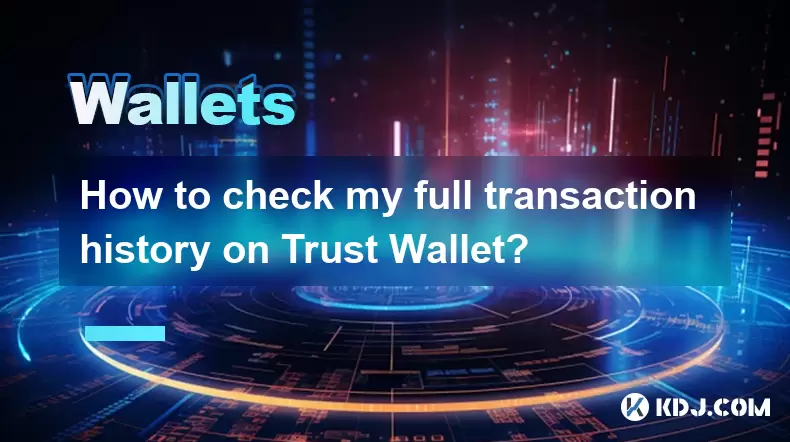
How to check my full transaction history on Trust Wallet?
Aug 02,2025 at 09:24am
Understanding Transaction History in Trust WalletTrust Wallet is a widely used non-custodial cryptocurrency wallet that supports a broad range of bloc...
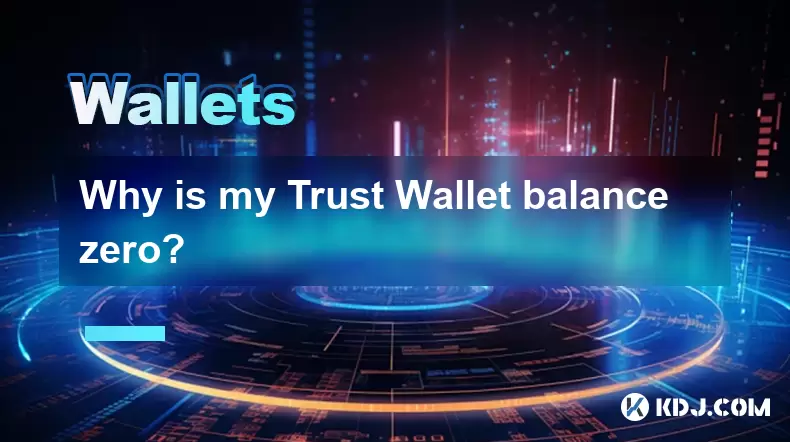
Why is my Trust Wallet balance zero?
Aug 02,2025 at 03:49am
Understanding Trust Wallet Balance Display IssuesIf you're seeing a zero balance in your Trust Wallet despite knowing you've previously received or se...
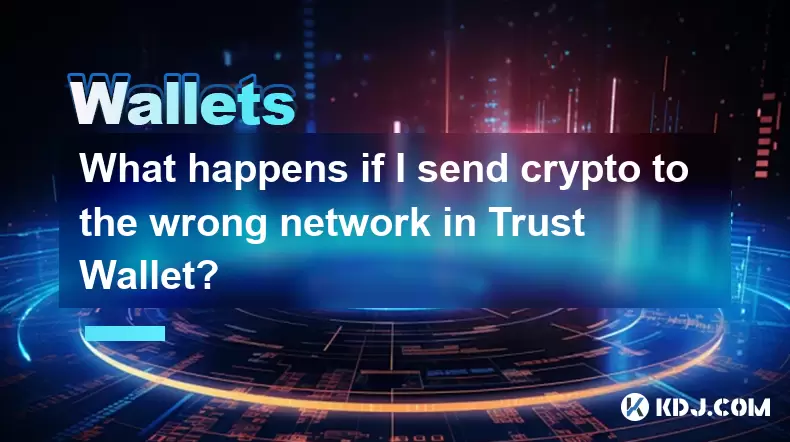
What happens if I send crypto to the wrong network in Trust Wallet?
Aug 02,2025 at 07:22pm
Understanding Network Compatibility in Trust WalletWhen using Trust Wallet, it's essential to understand that different cryptocurrencies operate on di...
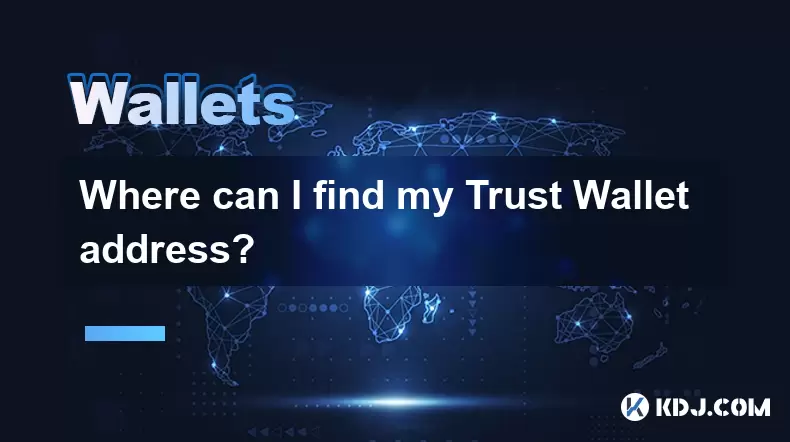
Where can I find my Trust Wallet address?
Aug 02,2025 at 06:07pm
Understanding Your Trust Wallet AddressYour Trust Wallet address is a unique identifier that allows others to send you cryptocurrency. It is a string ...

What is a watch-only wallet in Trust Wallet?
Aug 02,2025 at 03:36am
Understanding the Concept of a Watch-Only WalletA watch-only wallet in Trust Wallet allows users to monitor a cryptocurrency address without having ac...

How to switch between networks in Trust Wallet?
Aug 02,2025 at 12:36pm
Understanding Network Switching in Trust WalletSwitching between networks in Trust Wallet allows users to manage assets across different blockchains s...

How to check my full transaction history on Trust Wallet?
Aug 02,2025 at 09:24am
Understanding Transaction History in Trust WalletTrust Wallet is a widely used non-custodial cryptocurrency wallet that supports a broad range of bloc...

Why is my Trust Wallet balance zero?
Aug 02,2025 at 03:49am
Understanding Trust Wallet Balance Display IssuesIf you're seeing a zero balance in your Trust Wallet despite knowing you've previously received or se...

What happens if I send crypto to the wrong network in Trust Wallet?
Aug 02,2025 at 07:22pm
Understanding Network Compatibility in Trust WalletWhen using Trust Wallet, it's essential to understand that different cryptocurrencies operate on di...

Where can I find my Trust Wallet address?
Aug 02,2025 at 06:07pm
Understanding Your Trust Wallet AddressYour Trust Wallet address is a unique identifier that allows others to send you cryptocurrency. It is a string ...
See all articles

























































































